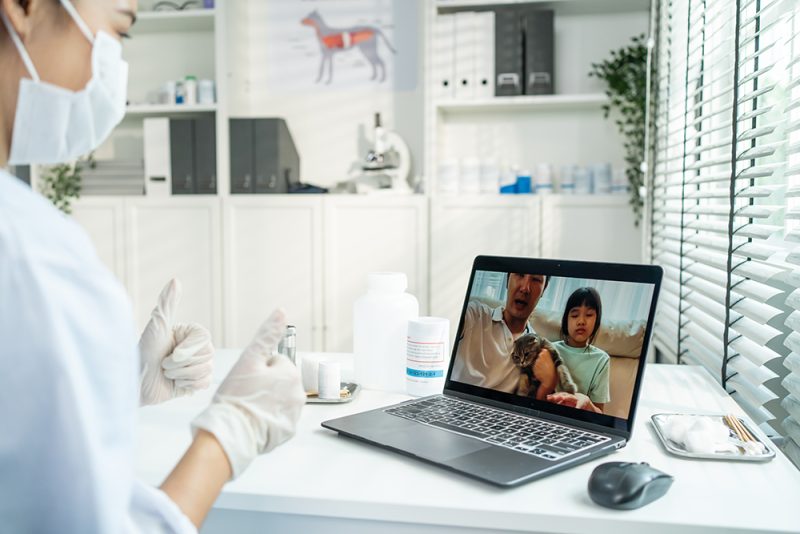- July 6, 2024
Virtual Vet Visits: What to Expect & FAQ (Vet Verified)

The information is current and up-to-date in accordance with the latest veterinarian research.
Virtual doctor visits or telemedicine is a product of the pandemic and the restrictions it imposed. Nevertheless, virtual vet visits have stuck around and serve a purpose and have many benefits for pet owners, particularly for cats. Dogs often ride in vehicles, whether going to the vet or the doggie park.
Meanwhile, cats don’t typically get this exposure, making virtual vet visits a more viable option to relieve stress and anxiety. However, there are times when virtual visits just make more sense, especially if it’s not an emergency situation and you just have a few questions about your cat’s signs and behavior.

How Does It Work?

The premise of a virtual vet visit is to conduct an appointment online instead of in person. Instead of hauling your cat to the clinic, everything happens virtually. Your vet will take a history from you and will ask you questions for clarification. They can also observe your pet for signs of certain issues. You get the same dedicated time to ask questions for the scheduled duration.
The biggest difference is the setting. The appointment happens at home instead of the clinic. It requires a good Internet connection to put it on a par with an in-office visit. However, they obviously won’t be able to perform a physical exam, and some vets won’t be able to make a diagnosis or prescribe medications virtually.
What Are the Different Types of Virtual Vet Visits?
There aren’t different types of virtual vet visits, per se, because of the limitations of the meeting. However, you can give your vet pertinent information to help them arrive at a diagnosis or at least an assessment of what’s happening with your cat. After all, felines are notorious for hiding pain or other signs of an issue. A vet must rely on your evidence and your cat’s signs and then make suggestions from there.
Where Is It Used?
Virtual vet visits typically occur at home. You should do it in a small room, like a bathroom, so your cat is visible and accessible. Avoid taking the call someplace where your kitty can hide under a bed or other place. The visual component is vital for the value of this offering. For example, if your pet is limping, your vet must see how it affects their mobility to make an accurate assessment of the problem and advise on the next steps.
You can conduct the visit wherever you and your cat are, which adds to their value. You can do the virtual vet visit at home or on the road. The only criterion is a reliable connection. We suggest having notes of what’s going on with your kitty to make the best use of your time if there is a limit.

Advantages of Virtual Vet Visits
The greatest advantage of virtual vet visits is stress reduction. Too much stress can mask the clinical signs your vet needs to evaluate your kitty’s issue. They are more likely to see the animal’s normal behavior than something stress-induced. Felines are going to be on their guard someplace else, which can hinder a diagnosis.
It can also save you time and money to make the visit virtually. It’s one thing if you work from home, but it’s another thing if you have to take time off from work. That adds to your stress and can make the appointment more costly for you. Often, virtual vet visits are less expensive than going into the office.
It’s worth noting that some appointments aren’t worth bringing your cat to the clinic. That may include behavioral issues or follow-up visits. Sometimes, a vet may not have to touch or examine your pet physically. It can also save your vet time when dealing with these cases.
Disadvantages of Virtual Vet Visits
A virtual vet visit can’t accurately assess every problem. Your vet may need to examine your cat physically to make a diagnosis. They may have to conduct tests that can’t happen online. This may delay the diagnosis and treatment of your pet, or end up costing you more if you have to bring your pet into the clinic anyway.
If you don’t have an existing veterinary-client-patient relationship (VCPR) with the vet you speak to virtually, they will be unable to diagnose or prescribe medication. A VCPR usually needs to be established by your pet being examined by a veterinarian in person, although some states allow it to be established remotely.

Frequently Asked Questions (FAQ)
Does Pet Insurance Cover Virtual Vet Visits?
Some pet insurers cover virtual vet visits or calls to a vet to discuss issues. There’s no doubt that they can save money and time for caregivers and veterinarians. The companies also want to optimize costs. We suggest checking the details of these exams before scheduling one. Take advantage of these savings if they are applicable.

Can Vets Prescribe Medications During a Virtual Exam?
This depends, as state laws vary. Some online vet clinics can prescribe medications, while others can’t. We suggest checking ahead of time if this is possible in your state and with the clinic.
What Do Virtual Vet Visits Cost?
The cost varies with the service. However, they are typically less expensive since the vet doesn’t have to rely on support personnel like techs and receptionists. You may find limits on the number of visits. In some situations, they may not replace an in-person exam, which may negate any savings.

Conclusion
Virtual vet visits are an excellent time-saver for situations where they can help with pet issues. They prevent stress from a car ride to the clinic and allow the vet to observe normal pet behavior. That’s a problem with cats especially, making this option a godsend in some cases. However, limitations exist. They involve the nature of the issues and state regulations. Nevertheless, they benefit pet owners and their felines in many cases.
Featured Image Credit: Katcha_Natsarin, Shutterstock
Tags
What do you think?
Related Articles

New Puppy Checklist: Gear You’ll Need for Your New Dog
Getting a new puppy is really exciting, but before you welcome them home, it’s important to prepare your space for them. Since puppies need a

How Big Do Mini Poodles Get? Vet Reviewed Average Weight & Growth Chart – Dogster
The information is current and up-to-date in accordance with the latest veterinarian research. Learn more » When you buy a Miniature Poodle, you might not

Can Police Dogs Smell Nicotine? Vet Verified Facts & Info – Dogster
The information is current and up-to-date in accordance with the latest veterinarian research. Learn more » While cigarette sales have been declining steadily for decades,

How Old Is 5 in Dog Years? Vet-Approved Guide to Each Size of Dog – Dogster
The information is current and up-to-date in accordance with the latest veterinarian research. Learn more » A common method for calculating a dog’s age is

